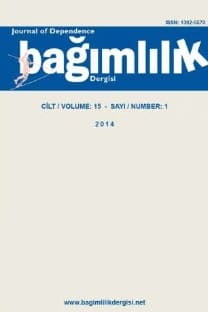Alkol bağımlılığında nüks ve eş tutumları
Amaç: Alkol bağımlılığında tedaviye başvuru, tedavi ve nüks önleme aşamalarında ailelerin davranış örüntüleri farklılıklar gösterir. Bu çalışmada alkol bağımlılarında nükslerin "alkol kullanımına karşı eş tutumları" ile ilişkisi davranışçı aile modeli çerçevesinde araştırılmıştır. Yöntem: Çalışmaya yataklı tedavi programını tamamladıktan sonra nüks eden evli, eşi ile birlikte yaşayan 40 erkek alkol bağımlısı alınmıştır. Kontrol grubunu da bir kez hastaneye yattıktan sonra nüks etmeyen evli, eşi ile birlikte yaşayan 40 erkek alkol bağımlısı oluşturmuştur. Eşlerin "tutumları" "içme davranışını pekiştirme; içmenin olumsuz sonuçlarından koruma ve içme davranışını cezalandırma" olarak gruplandırılmış ve istatistiksel incelemeler bu ayrım üzerinden SPSS paket programında yapılmıştır. Bulgular: Tedavi öncesi "eş tutumları" açısından iki grup benzer özellikler göstermektedir (x2=3,05; df=3; p > 0,05). Tedavi sonrası yapılan değerlendirmede ise istatistiksel olarak anlamlı farklılık bulunmuştur (x2=86,0; df=3; p=0). Nüks eden grupta eşlerin tedavi sonrası tutumlarında belirgin olarak "içme davranışını cezalandırma" özellikleri görülmüştür. Sonuç Bulgular, davranışçı aile modelinin ilkeleri ile yapılan değerlendirmelerde alkol içme dönemindeki eş tutumları ne olursa olsun hastane tedavisi sonrasındaki eş tutumlarının değiştiğini ve bu değişikliğin nükslerin önlenmesinde etkili olduğunu düşündürmektedir. İçme davranışını cezalandırıcı tutumlar sonraki nüksleri belirliyor görünmektedir.
Relapse in alcohol dependency and partner attitudes
Objective: There are different patterns of family behavior related to intervention and continuation of treatment and relapse prevention in alcohol dependency. In this study interrelation with relapses in alcoholism and "attitutes of partner against alcohol use" was evaluated according to the principles of behavioral family model. Method: In the study 40 male patients who relapsed after accomplishing the inpatient treatment programme compared with a control group of 40 male patients who were abstinent. All participants were married and were living with their families. The subgroups were formed according to "behavioral characteristics of the partner" as follows: behavioral enhancement of drinking; protection against the harmful effects of drinking; punishment of drinking. Statistical analysis was done on SPSS statistics programme. Results: The pretreatment attitutes of the partner of two groups are similiar (x2=3.05; df=3; p > 0,05). There are statistically significant differences between posttreatment results of two groups (x2=86,0; df=3; p=0). Especially in the relapsing group "punishment of drinking" features are evident. Conclusion: The results of behavioral family model approach support that pretreatment behavioral characteristics of the partner has no effect on drinking behavior. Posttreatment altered behavioral characteristics seems to have an effect on relapse in alcohol dependency. Punishing attitutes against drinking may determine subsequent relapses.
___
- 1-Gorski T.T., Miller M.; Staying Sober: a guide for relapse prevention. Herald House/Independence Press. 1986.
- 2-Lawson G., Peterson J.S., Lawson A.; Alcoholism and the Family: A Guide to Treatment and Prevention. Rockville, MD, Aspen, 1983.
- 3-Steinglass P., Bennett L., Wolin S.J., Reiss D.; The Alcoholic Family. New York, Basic Books, 1987.
- 4-Steinglass P.; Family Therapy:Alcoholism. . In Textbook of Substance Abuse Treatment. Eds. Marc Galanter, Herbert D. Kleber. American Psychiatric Press İnc., Washington , DC, 1994 pp 315-329.
- 5-Mc Crady B.S.; The family in the change process, in Treating Addictive Behaviors: Processes of Change. WR Miller, NH Heather (eds). New York, Plenum, 1986, pp 305, 318.
- 6-Jacobson N.S., Holtzworth-Munroe A., Schmaling K.B.; Marital therapy and spouse involvement in the treatment of depression, agoraphobia, and alcoholism. J Consult Clin Psychol 1989 57:5-10.
- 7-Mc Crady B.S.; The marital relationship and alcoholism, in Alcohol and Family: Research and Clinical Perspectives. RL Collins, KE Leonard, JS Searles. New York, Guilford, 1990, pp 338-355.
- 8-O’Farrell T.J., Cutter H.S.G.; Behavioral marital therapy couples groups for male alcoholics and their wives. J Subst Abuse Treat 1984; 1:191-204.
- 9-Gorski T., Miller M.; Focus on Family. “Relapse: Family’s involment”, Part I, II, III. Hollywood Fl., The US Journal of Drug and Alcohol Dependence, Inc. Sept./Oct., Nov./Dec., 1983, Jan./Feb. 1984.
- 10-Türkcan A., Akvardar Y., Çakmak D.; Alkol bağımlılarında algılanan sosyal destek. 34. Ulusal Psikiyatri Kongresi, 29 Eylül 3 Ekim 1998, Altınyunus, Çeşme İzmir (poster bildiri).
- 11-American Psychiatric Association: Diagnostic and statistical Manual of Mental Disorders, 4 th Edition. Washington, D.C. American Psychiatric Association, 1994.
- 12-Kalyoncu A., Mırsal H., Pektaş Ö., Şatır T., Serez M., Beyazyürek M.; Yatarak Tedavi Gören Alkol Bağımlıları İçin Örnek Bir Tedavi Programı, Bağımlılık Dergisi 2000; 1(1):27-31.
- 13-Gliedman L.H., Rosenthal D., Frank J.D., Nash H.T.; Group therapy of alcoholics with concurrent group meetings with their wives. Quarterly Journal of Studies on Alcohol 1956; 17:655-670.
- 14-Ewing J.A., Long V., Wenzel G.G.; Concurrent group psychotherapy of alcoholics patients and wives. International Journal of Group Psychotherapy 1961; 11:329-338.
- 15-Meeks D.E., Kelly C.; Family therapy with the families recovering alcoholics. Quarterly Journal of Studies on Alcohol 1970; 31:399-413.
- 16-Steinglass P., Davis D.I., Berensen D.; Observations of conjointly hospitalized “alcoholic couples” during sobriety and intoxication: Implications for theory and therapy. Family Process 1977; 16:1-16.
- 17-Marlatt G.A., Gordon J.R.; Relapse Prevention. Maintenance Strategies in the Treatment of Addictive Behaviors. The Guilford Press, New York, 1985.
- 18-Wakefield P.J., Williams R.E., Yost E.B., Patterson K.M.; Couple Therapy For Alcoholism: A Cognitive-Behavioral Treatment Manuel. The Guilford Press, New York, 1996.
- ISSN: 1302-5570
- Yayın Aralığı: Yılda 4 Sayı
- Başlangıç: 2000
- Yayıncı: Galenos Yayınevi
